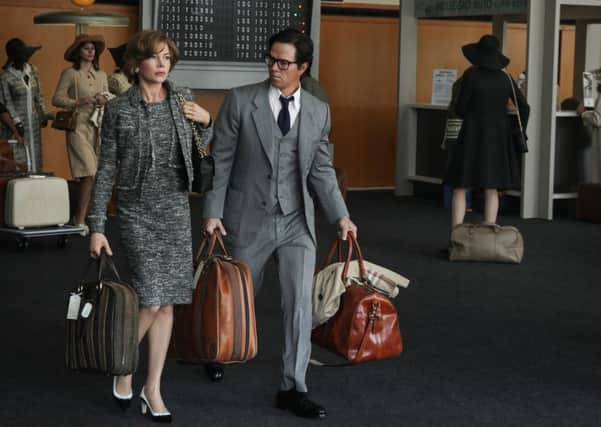Film reviews: All the Money in the World | Hostiles | Brad's Status


All the Money in the World (15) ****
Hostiles (15) ***
Brad’s Status (15) **
Watching All the Money in the World you’d never know Kevin Spacey was once cast in this true life story about oil baron J Paul Getty and the kidnapping of his grandson and heir John Paul Getty III. Ridley Scott’s 11th hour decision to cut the disgraced star from the finished film just six week’s before its American Christmas Day release may be one of the more extraordinary Hollywood production stories of recent years, but in recasting the role of Getty Snr with 88-year-old Oscar-winner Christopher Plummer, the veteran director’s technical bravado ensures it’s practically impossible to see the joins.
Not that there was ever much doubt Scott wouldn’t be able to pull this off (he pioneered this kind of technical wizardry when Oliver Reed inconveniently died before finishing Gladiator). But what’s surprising is that Spacey’s part clearly wasn’t some showy supporting role. Getty is pretty much the main character here and Plummer has at least as much screen time as Michelle Williams and Mark Wahlberg, respectively cast as Getty’s estranged daughter-in-law Gail Harris and his CIA-trained fixer Fletcher Chase.
Advertisement
Hide AdIndeed, in refusing to even countenance delaying the film – which would have taken it out of contention for this year’s Oscars as well as putting it behind the release of Trust, Danny Boyle’s forthcoming television dramatisation of the same story – Scott’s ruthless pragmatism has yielded an unexpectedly rich opportunity for Plummer to once again show what he can do in a leading role. Playing the “richest man in the history of the world,” he brings an authentic sense of patrician worldliness to Getty, who is first introduced washing his own socks in a grand hotel suite, a sign of the frugal mindset that enables the wealthy to hoard their fortunes, as well as foreshadowing Getty’s own cold-hearted refusal to pay his teenage grandson’s ransom when he’s kidnapped by Calabrian thugs in Rome in 1973.
Scott kicks off with the kidnapping and it’s a beautifully staged sequence, with newcomer Charlie Plummer (no relation to Christopher) gliding through the streets as 16-year-old Paul Getty, his long hair, fine tailoring and easy way with those he meets suggestive of the casualness with which the super-rich assume the rest of the world has been calibrated to bend to their will. He’s rudely disavowed of this notion moments later when he’s bundled into the back of a van, an ordeal exacerbated in grimly symbolic ways when his kidnappers’ $17 million ransom demand falls on deaf ears, the elder Getty reasoning that payment will result in him having 14 kidnapped grandchildren, not just one. This forces Paul’s mother – now broke having long since separated from Paul’s wastrel father – to negotiate both with the kidnappers and her former father-in-law, discovering to her horror that the latter may be more ruthless than the former.
The film jumps around a lot to fill in the family history and Scott locates the roots of Gail and Getty’s enmity in a power-play related to her willingness to give up any claim on the Getty fortune in return for full custody of her children – a move that raises Getty’s suspicions because he can’t understand what angle she’s playing. That of course says a lot about his own bankrupt morality and helps explain why he takes solace in owning things rather than developing nourishing relationships with those closest to him. Naturally, Scott ratchets up the drama of the kidnapping as well (particularly as it gets bloodier and more desperate), yet it’s Plummer’s malevolent performance that dominates the film, turning it into a darkly entertaining movie about the corrupting nature of money and the true cost of wealth.
Directed by Scott Cooper, Hostiles sees the Crazy Heart/Black Mass director turn his earnest, studious gaze on the western with a revisionist movie that seeks to reconcile the genre’s classic iconography with its troubling racial politics. Christian Bale takes the lead as Joseph Blocker, an about-to-retire army captain who is ordered to transport a dying Cheyenne prisoner (Wes Studi) and his family to their ancestral lands so he can die in peace. Both hate each other and both have much blood on their hands, but their mutual contempt is challenged when they encounter Rosalee Quaid (Rosamund Pike), a young homesteader whose family has been slaughtered by a tribe of Commanches. With Rosalee joining their convoy for safety, they encounter all manner of threats en route – something that enables the film to symbolically explore the complexities underlying the birth of modern America just as the frontier is closing. An unashamedly slow-burning, meditative film, jolted to life by moments of extreme but considered violence, Hostiles may not have the force of a modern classic like The Revenant, but it’s a respectable addition to the genre.
Ben Stiller’s penchant for playing sad sack neurotics reaches breaking point in Brad’s Status, a charmless indie-by-numbers comedy/drama about a self-righteous egomaniac who suffers a crisis of confidence when his son’s imminent departure for college causes him to reassess his own life choices. Writer/director Mike White squanders a good cast (Michael Sheen, Jenna Fischer, Luke Wilson) on a fairly generic story that fails to offer much in the way of profundity. Stiller has already rung this bell in his superior collaborations with Noah Baumbach and we’re not exactly short of films exploring the anxieties of middle-aged white guys worried about life leaving them behind.